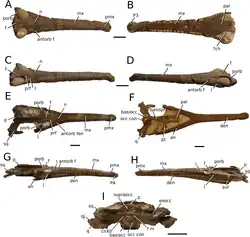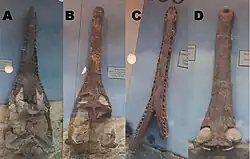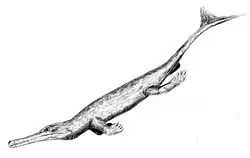Yvridiosuchus
| Yvridiosuchus Temporal range: Middle Jurassic
| |
|---|---|

| |
| Holotype of 'Y. boutilieri and referred specimen (holotype of "S." meretrix) | |
| Scientific classification | |
| Kingdom: | Animalia |
| Phylum: | Chordata |
| Class: | Reptilia |
| Clade: | Archosauria |
| Clade: | Pseudosuchia |
| Clade: | Crocodylomorpha |
| Suborder: | †Thalattosuchia |
| Family: | †Machimosauridae |
| Tribe: | †Machimosaurini |
| Genus: | † Johnson et al., 2019 |
| Species: | †Y. boutilieri
|
| Binomial name | |
| †Yvridiosuchus boutilieri | |
| Synonyms | |
| |
Yvridiosuchus (meaning "hybrid crocodile") is an extinct genus of machimosaurid crocodyliform from the Middle Jurassic (Bathonian) Cornbrash Formation of England and the Sommet de la Grande Oolithe, Calvados, France.
History

The type species was originally named in 1868 as the species Steneosaurus boutilieri. The genus Steneosaurus was used as a longtime wastebasket taxon for various teleosauroid specimens and had more than a dozen species. The type species, Steneosaurus rostromajor is undiagnostic, making the genus and species dubious and invalid. Additionally, many species of so-called "Steneosaurus" were found to be quite different and unrelated to one another, thus needing new generic names.[1]
In 2019, Michela Johnson and colleagues redescribed "Steneosaurus" boutillieri, creating the new genus and combination Yvridiosuchus boutilieri. Its name references its combination of traits seen in both more basal and more derived machimosaurids. They also found the species "Steneosaurus" meretrix
Classification
Yvridiosuchus is the oldest known member of Machimosaurini, a clade of large, predatory machimosaurids with powerful jaws and teeth. Yvridiosuchus was named on the basis that it has characteristics of both earlier machimosaurids and the derived machimosaurins, such as conical, blunt teeth.
The cladogram below is from an analysis by Johnson and colleagues in 2020.[1]
Ecology
Yvridiosuchus had large and powerful jaws, with very large muscle attachment sites. Additionally, this species possessed both conical and blunt dentition. All of this suggests that it was well adapted for feeding on large and armored prey items such as turtles and large fish.[2]
It co-existed with the more generalist machimosaurid Deslongchampsina, showing how multpiple machimosaurids could coexist by focusing on different types of prey.[3]
References
- ^ a b Johnson, Michela M.; Young, Mark T.; Brusatte, Stephen L. (2020). "The phylogenetics of Teleosauroidea (Crocodylomorpha, Thalattosuchia) and implications for their ecology and evolution". PeerJ. 8: e9808. doi:10.7717/peerj.9808. PMC 7548081. PMID 33083104.
- ^ Johnson, M. M.; Foffa, D.; Young, M. T.; Brusatte, S. L. (2022). "The ecological diversification and evolution of Teleosauroidea (Crocodylomorpha, Thalattosuchia), with insights into their mandibular biomechanics". Ecology and Evolution. 12 (11): e9484. Bibcode:2022EcoEv..12E9484J. doi:10.1002/ece3.9484. hdl:20.500.11820/07ef2706-2019-40ec-add6-6eb522f6f193. PMC 9674474. PMID 36415878.
- ^ Michela M. Johnson; Mark T. Young; Stephen L. Brusatte (2019). "Re-description of two contemporaneous mesorostrine teleosauroids (Crocodylomorpha: Thalattosuchia) from the Bathonian of England and insights into the early evolution of Machimosaurini". Zoological Journal of the Linnean Society. Advanced online publication (2): 449–482. doi:10.1093/zoolinnean/zlz037. hdl:1842/36656.
